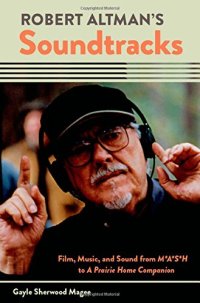
Ebook: Robert Altman's Soundtracks: Film, Music, and Sound from M*A*S*H to A Prairie Home Companion
Author: Gayle Sherwood Magee
- Tags: History Criticism Music Arts Photography Theory Composition Performance Movies Humor Entertainment Reference Test Preparation Almanacs Yearbooks Atlases Maps Careers Catalogs Directories Consumer Guides Dictionaries Thesauruses Encyclopedias Subject English as a Second Language Etiquette Foreign Study Genealogy Quotations Survival Emergency Preparedness Words Grammar Writing Research Publishing
- Series: Oxford Music/Media Series
- Year: 2014
- Publisher: Oxford University Press
- Edition: 1
- Language: English
- pdf
American director Robert Altman (1925-2006) first came to national attention with the surprise blockbuster M*A*S*H (1970), and he directed more than thirty feature films in the subsequent decades. Critics and scholars have noted that music is central to Altman's films, and in addition to his feature films, Altman worked in theater, opera, and the emerging field of cable television. His treatment of sound is a hallmark of his films, alongside overlapping dialogue, improvisation, and large ensemble casts. Several of his best-known films integrate musical performances into the central plot, including Nashville (1975), Popeye (1980), Short Cuts (1993), Kansas City (1996), The Company (2003) and A Prairie Home Companion (2006), his final film. Even such non-musicals as McCabe and Mrs. Miller (1971) have been described as, in fellow director and protégé Paul Thomas Anderson's evocative phrase, as "musicals without people singing."
Robert Altman's Soundtracks considers Altman's celebrated, innovative uses of music and sound in several of his most acclaimed and lesser-known works. In so doing, these case studies serve as a window not only into Altman's considerable and varied output, but also the changing film industry over nearly four decades, from the heyday of the New Hollywood in the late 1960s through the "Indiewood" boom of the 1990s and its bust in the early 2000s. As its frame, the book considers the continuing attractions of auteurism inside and outside of scholarly discourse, by considering Altman's career in terms of the director's own self-promotion as a visionary and artist; the film industry's promotion of Altman the auteur; the emphasis on Altman's individual style, including his use of music, by the director, critics, scholars, and within the industry; and the processes, tensions, and boundaries of collaboration.
Robert Altman's Soundtracks considers Altman's celebrated, innovative uses of music and sound in several of his most acclaimed and lesser-known works. In so doing, these case studies serve as a window not only into Altman's considerable and varied output, but also the changing film industry over nearly four decades, from the heyday of the New Hollywood in the late 1960s through the "Indiewood" boom of the 1990s and its bust in the early 2000s. As its frame, the book considers the continuing attractions of auteurism inside and outside of scholarly discourse, by considering Altman's career in terms of the director's own self-promotion as a visionary and artist; the film industry's promotion of Altman the auteur; the emphasis on Altman's individual style, including his use of music, by the director, critics, scholars, and within the industry; and the processes, tensions, and boundaries of collaboration.
Download the book Robert Altman's Soundtracks: Film, Music, and Sound from M*A*S*H to A Prairie Home Companion for free or read online
Continue reading on any device:

Last viewed books
Related books
{related-news}
Comments (0)